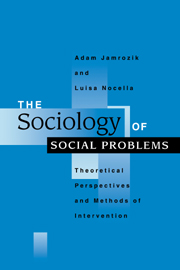Book contents
- Frontmatter
- Contents
- List of Tables
- List of Figures
- Preface and Acknowledgements
- 1 Introduction: Theoretical Perspectives on Social Problems
- 2 Contemporary Perspectives on Social Problems
- 3 Methods of Intervention in Social Problems
- 4 Social Actors in Social Problems
- 5 Challenges of Contemporary Social Problems
- 6 Social Problems in the Residualist Conversion Perspective
- 7 Inequality – The Underlying Universal Issue in Social Problems
- 8 The Social Construction of Family Problems
- 9 The Problem of Social Order
- 10 The Theory of Residualist Conversion: Does it Meet the Test?
- 11 Conclusions and Implications
- Bibliography
- Index
1 - Introduction: Theoretical Perspectives on Social Problems
Published online by Cambridge University Press: 29 March 2011
- Frontmatter
- Contents
- List of Tables
- List of Figures
- Preface and Acknowledgements
- 1 Introduction: Theoretical Perspectives on Social Problems
- 2 Contemporary Perspectives on Social Problems
- 3 Methods of Intervention in Social Problems
- 4 Social Actors in Social Problems
- 5 Challenges of Contemporary Social Problems
- 6 Social Problems in the Residualist Conversion Perspective
- 7 Inequality – The Underlying Universal Issue in Social Problems
- 8 The Social Construction of Family Problems
- 9 The Problem of Social Order
- 10 The Theory of Residualist Conversion: Does it Meet the Test?
- 11 Conclusions and Implications
- Bibliography
- Index
Summary
Social problems are an integral part of social life. The term ‘social problem’ applies to social conditions, processes, societal arrangements or attitudes that are commonly perceived to be undesirable, negative, and threatening certain values or interests such as social cohesion, maintenance of law and order, moral standards, stability of social institutions, economic prosperity or individual freedoms. A social problem may also be experienced as a feeling of collective guilt created through an awareness of collective neglect to remove or alleviate certain undesirable social conditions that negatively affect some sections of society.
In this definition of social problems therefore there is no presumed value- or attitudinal-neutrality in perception, interpretation or intervention. This particular attribute differentiates social phenomena that are perceived to be social problems from other social or physical phenomena or conditions that are regarded as problems tout court, and that are perceived perhaps as not quite desirable or pleasant but without an element of threat. Furthermore, a social problem is also a condition ‘created’ by society that is, potentially at least, feasibly alleviated or solved by society. On the other hand, some physical phenomena or ‘natural disasters’ such as earthquakes, droughts or floods occur beyond social control, although the knowledge of their probability enables societies to take preventive or remedial actions. With such physical phenomena, the knowledge of the ability to take preventive or remedial actions but the failure to do so would then be perceived as a social problem.
- Type
- Chapter
- Information
- The Sociology of Social ProblemsTheoretical Perspectives and Methods of Intervention, pp. 1 - 16Publisher: Cambridge University PressPrint publication year: 1998



